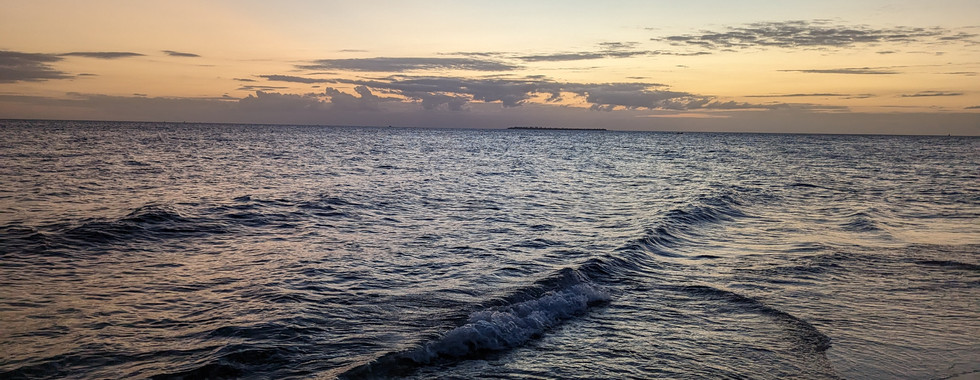In early May, Zanzibar is dead. Not in a literal, medical sense: it's more dormant. Resting. Stunned. Bereft of life, it rests in peace. But in the language of bored bartenders and sleepy shopkeepers, it's dead.

All the tourist guides warn against visiting at this time of year. The famous crystal-clear waters and cloudless skies come later, in high summer. May is transient: there's supposed to be choppy seas, bruised clouds, and daily thunderstorms.
Fortunately for me, these turned out to be empty threats. A polite but firm southerly breeze blew through each day and threw up a patchwork quilt of clouds, but none of the accompanying rain materialised.
Arriving in Stone Town felt like walking into a cathedral on a weekday afternoon. The empty choristers’ benches and the dull gleam of organ pipes might have betrayed that there was the capacity for glorious music to billow up into the stone arches and consume the neat rows of creaking wooden pews, but it wasn’t there. Somehow, the absence of noise where clearly there ought to be some is more powerful than the silence itself.
I liked it that way.
I felt privy to something fleeting and rare, like being invited to an early rehearsal of a Broadway show where the performers aren’t in costume and the director is wandering around on stage muttering to themselves.
In my case, the cast was made up of a handful of fellow tourists and a skeleton crew of locals. The two-legged population was almost matched in number by a pride of magnificently haughty stray cats.

On my first afternoon, I settled in for a beer at Livingstone’s, a tired old beachfront bar with high ceilings and teak countertops. A fan spun slowly above the bar, the blades wading through the thick air to complete their laboured circles. As with almost all the cafes and restaurants I came across it was completely empty, and I chose a stocky table out on the sand with a view of the sun falling into the sea. From there, I had a front-row seat in a 180-degree slice of life in Zanzibar.
To my left was the opulent Hyatt, with a neat row of sunbeds roped off from the unwashed rabble of ordinary people wandering down the narrow beach in front. In front of me, a group of kids juggled a soccer ball, bare-chested men did push-ups in the sand, and a man tried to sell me a Zanzibar jersey with the (admittedly smooth) catchphrase “sun goes down, now the price goes down too!”. Close to shore, thin boats shaped like pencil cases jutted out into the sea, with names like MR BEAN, JAMBO and GLADIATOR. Beyond them, disused passenger ferries and ancient dhows tugged gently at their anchors. Towards the horizon, container ships waited patiently for their turn at the largely unbothered docks away to my right.
Because the beach faced towards the African mainland, the waves were no more than little crests the height of an outstretched hand which flopped on the sand, occasionally interspersed with a hurried set of larger ones when the catamaran to Dar es Salaam went past and threw its wake away behind it.

Sometimes a beer just tastes better. It’s the same ingredients in the same bottle at the same temperature, but through circumstance, or mood, or some complicated sensory symphony, it feels like every other beer you’ve ever had is a distant second to that one in that moment. The beer becomes greater than the sum of its parts; it’s about what the beer represents, rather than the mechanics of what it is. This was one of those times.
Later that night I went out to dinner with a Dutch girl called Floor (don’t worry, she knows) who I met at the hostel we were staying in. We talked in the way people who’ve never met talk, about random things in no particular order, feeling each other out and finding our differences and common ground.
We got onto the difference between men and women. In an argument I'd heard before, she said that women's brains were like lattices with everything interconnected, whereas men's brains were made up of boxes, where you could only open one at a time.
It's not an argument I particularly buy. I’m wary of neat Manichean dualities- I think human beings are complicated and interesting, but we are more alike than it first appears, and we seem to obsess over what makes us different rather than what we have in common.
Fortunately for both of us, I kept my mouth shut and played along.
To prove my loyalty to the idea, I spent a while trying to put all of my afternoon at Livingstone’s into a box. The fuzzy peach-skin sunset, my toes kicked deep into African sand, the listless strains of Hotel California coming from the speakers in the bar, the sea stretching out in front of me, the gentle brush of waves onto the beach, the incandescent, triumphant taste of my first beer in three months.
I hoped I could capture it all and box it up to be reopened and revisited. If Floor’s theory of men’s and women’s brains being different was true, then I was glad my brain wasn’t a lattice. I didn't particularly want this memory connected to anything. It deserved its own box. It needed to live freely, disconnected from any other parts of my life, like a pilot to a TV series never made. I imagined myself, months, years from now shuffling through the (moderately) cluttered shoe shop of my memory, and coming across this box.
I smiled.




















Comments